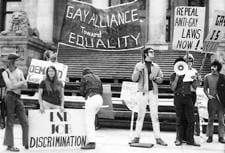Forty years after gays and lesbians staged their first demonstration simultaneously on Parliament Hill and at Robson Square, gay scholars and activists will reconvene in Vancouver for a commemorative conference on the history of sexuality.
“We Demand: History/Sex/Activism in Canada” will take place Aug 26 to 28, 2011, at the Coast Plaza Hotel.
The original demonstration, which attracted 150 people in Ottawa and 20 in Vancouver, took place on Aug 28, 1971.
On that grey summer day two years after gay sex was decriminalized, two groups of brave homosexuals stepped forward to publicly declare their sexuality and to demand an end to state discrimination.
The groups presented a 10-point list of demands drafted by members of Vancouver’s Gay Alliance Towards Equality and Toronto Gay Action. First among their demands of the federal government: remove the terms “gross indecency” and “indecent act” from the Criminal Code, terms traditionally used to target gay men.
“The major focus is activism around sexual rights, sexual health and politics and culture in the past four decades,” co-organizer Elise Chenier says of the upcoming conference.
Organizers are expecting about 150 people to attend.
“Because my feet are planted fairly firmly in the academy, what I’m most looking forward to is hearing from the activists,” Chenier says.
“There’s a lot of activism going on out there, and we don’t always necessarily hear about it,” she notes. “There are a lot of people that are working so hard — unpaid, underpaid or paid.
“In some ways I think a lot of the work of the ’70s, ’80s and ’90s that we’ll be talking about at the conference has paid off,” she adds.
She points to infrastructure for people with HIV/AIDS and greater awareness about sexuality and queer issues as examples of successes originating from the activism of those decades.
“I have such admiration for people active in the ’70s [who] are still active today, 40 years later,” Chenier says.
“It’s their heart, it’s their life.”
Organizing 2011’s We Demand conference has only further convinced Chenier that gay people need a place to meet and present their work.
She hopes to see a new queer studies association born out of the conference to replace the now-defunct Canadian Lesbian and Gay Studies Association.
“Sometimes it can be really hard to meet other people, even in your own university, doing queer work,” Chenier notes.
“Everybody says, ‘Yes, we have to do this,’ so we’re going to strike while the iron is hot.”
Parallelling the conference will be a queer film program hosted at Pacific Cinémathèque, the proceeds of which will go toward a sexualities scholarship for Simon Fraser University graduate students, to be formally launched during the conference.


 Why you can trust Xtra
Why you can trust Xtra


